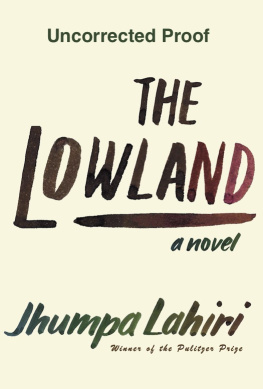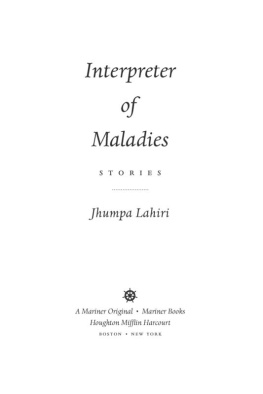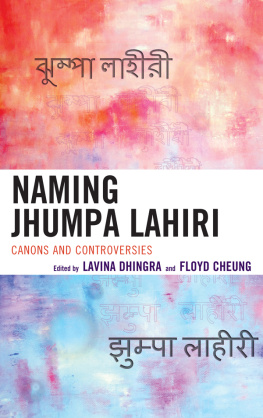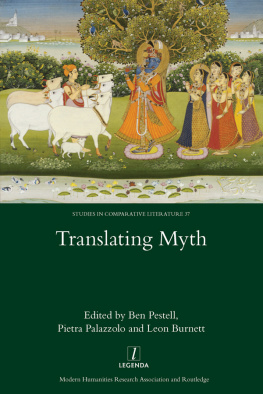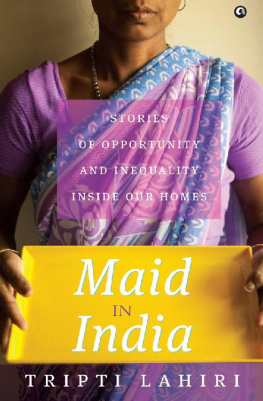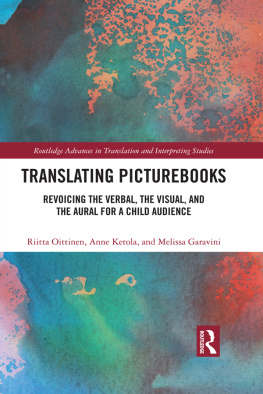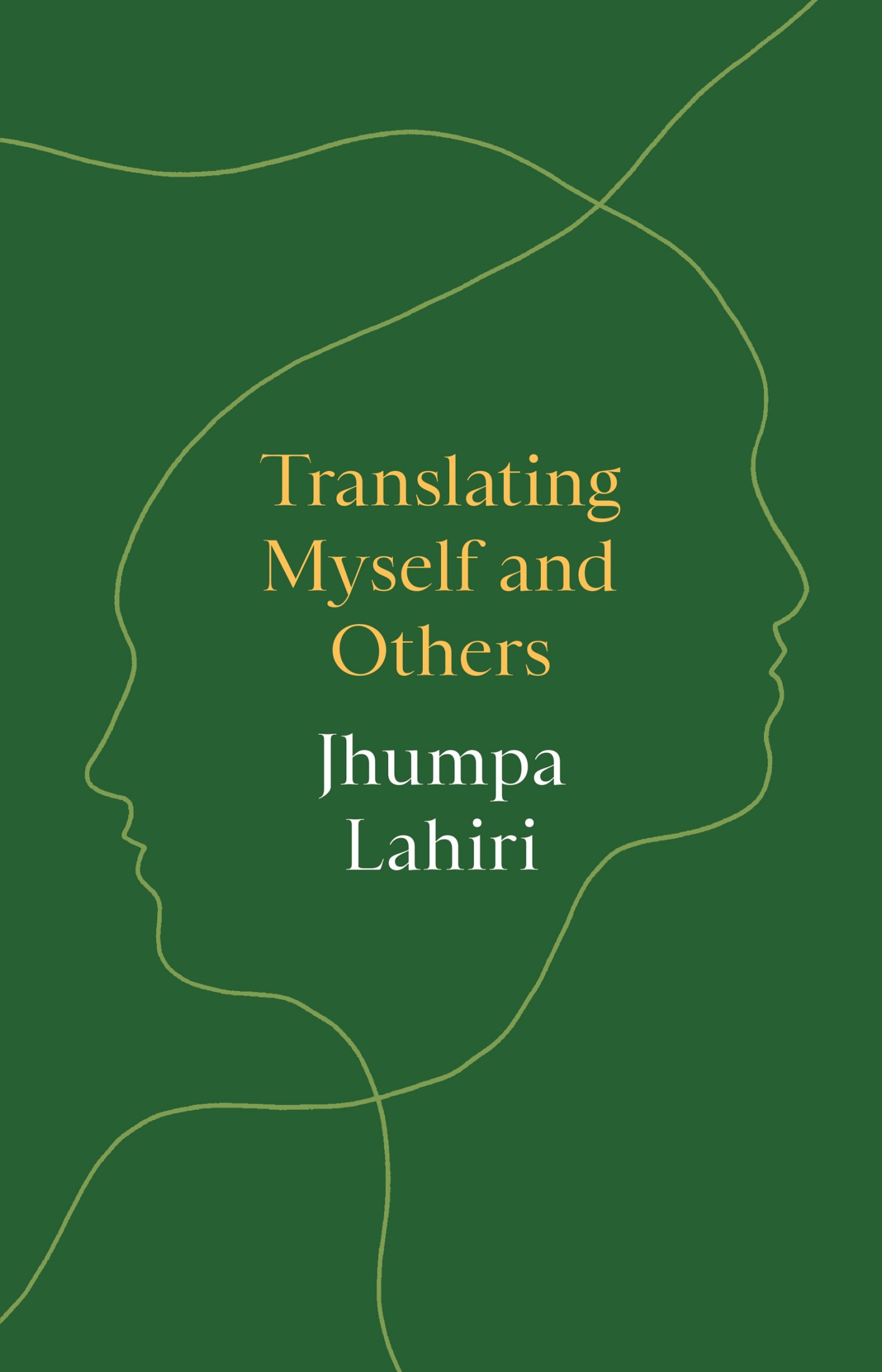TRANSLATING MYSELF AND OTHERS
Translating Myself and Others
Jhumpa Lahiri
PRINCETON UNIVERSITY PRESS
Princeton and Oxford
COPYRIGHT 2022 BY JHUMPA LAHIRI
Princeton University Press is committed to the protection of copyright and the intellectual property our authors entrust to us. Copyright promotes the progress and integrity of knowledge. Thank you for supporting free speech and the global exchange of ideas by purchasing an authorized edition of this book. If you wish to reproduce or distribute any part of it in any form, please obtain permission.
Requests for permission to reproduce material from this work should be sent to
Published by Princeton University Press
41 William Street, Princeton, New Jersey 08540
99 Banbury Road, Oxford OX2 6JX
press.princeton.edu
All Rights Reserved
First Indian subcontinent printing, 2022
ISBN 9780691244785
The Library of Congress cataloged the U.S. edition of this book as follows:
Names: Lahiri, Jhumpa, author.
Title: Translating myself and others / Jhumpa Lahiri.
Description: Princeton : Princeton University Press, [2022] | Includes bibliographical references and index.
Identifiers: LCCN 2021047885 (print) | LCCN 2021047886 (ebook) | ISBN 9780691231167 (hardback ; acid-free paper) | ISBN 9780691238609 (ebook)
Subjects: LCSH: Lahiri, Jhumpa. | Translating and interpreting. | Self-translation. | TranslatorsUnited States21st centuryBiography. | BISAC: LANGUAGE ARTS & DISCIPLINES / Translating & Interpreting | BIOGRAPHY & AUTOBIOGRAPHY / Women | LCGFT: Essays.
Classification: LCC P306.92.L34 A3 2022 (print) | LCC P306.92.L34 (ebook) | DDC 418/.02092dc23/eng/20211206
LC record available at https://lccn.loc.gov/2021047885
LC ebook record available at https://lccn.loc.gov/2021047886
Version 1.1
British Library Cataloging-in-Publication Data is available
Editorial: Anne Savarese and James Collier
Production Editorial: Ellen Foos and Jaden Young
Text Design: Amanda Weiss
Production: Erin Suydam
Publicity: Jodi Price and Carmen Jimenez
Copyeditor: Anne Cherry
Jacket/cover design and illustration by Amanda Weiss
For sale only in the Indian subcontinent (India, Pakistan, Nepal, Bhutan, Sri Lanka, Bangladesh, and Republic of Maldives)
Printed and bound in India by Replika Press Pvt. Ltd.
IN MEMORIAM
Tapati Lahiri
19392021
Poet, Translator,
Mother / Ma /
in multas igitur voces vox una repente
diffugit, in privas quoniam se dividit auris,
obsignans formam verbi clarumque sonorem.
LUCRETIUS, DE RERUM NATURA (4.5657)
Therefore one voice is suddenly dispersed
Into many voices, since it divides itself
Into separate ears, stamping onto them
The form of the word and its distinctive sound.
RONALD MELVILLE, TRANSLATOR
(CONTENTS)
- Afterword
Translating Transformation
Introduction
A translation dilemma is among my earliest memories. I was five, seated at a large table with many other children in a kindergarten classroom, making cards for Mothers Day. Together we folded stiff sheets of white paper, and constructed and pasted pink crepe-paper roses with green stems to the cover. The assistant teacher circled the table, spraying some perfume into each of our roses. Inside the card, we all had to handwrite the same message: Dear Mom, happy Mothers Day. This part of the project stymied me, given that my mother was not Mom but Ma. I was embarrassed to insert the Bengali term I used and knew her bythe one she recognized and responded to. I was also reluctant to resort to the English term, which sounded foreign to me, and would have certainly alienated, even offended her.
The memory is still fresh, though I can no longer remember what I chose to write inside the card. Revisiting that dilemma now, in 2021, it occurs to me that it has just as much to do with the act of writing as it does with translation. In other words, as soon as I learned how to write in English, which was one of the two languages I knew and spoke as a child, I simultaneously intuited the central and complex role that translation was to play. It also reminds me of the role, just as central and complex, that my mother was to play in my life as a writer, both as subject and inspiration.
In 2000, the year after my first book of short stories, Interpreter of Maladies, was published, I wrote an essay called To Heaven without Dying for the online magazine Feed. I was still new to the world of writing, still getting used to the idea of having become a writer in the first place. In that essaythe first occasion I had to assess my evolving creativity entirely on my own termsI speak of being born into a linguistic world split in two. I refer to my writing, in English, as a form of cultural translation, and to some of the stories in that collection as a translation of India. Reflecting on writing short stories in English about characters who talk in Bengali in my head, I note the need to translate their dialogue, thus turning them, falsely but necessarily, into English speakers. I conclude, dramatically, I translate, therefore I am.
Over twenty years later, this statement has only intensified in significance. I risk quoting myself not only to signal that this is a book about translation, but to acknowledge that I have been thinking about translation for my entire conscious life. As that early essay already makes clear, becoming a writer in English meant becoming a translator as well. And yet, I was a translator before I was a writer, not the other way around. As a graduate student, for my masters thesis, Id translated some short stories by the great Bengali writer Ashapurna Devi, thanks in great part to my mothers willingness to read them out loud. I would tape-record her, play back the cassettes, and work off our homemade audiobook, given that Bengali is a language I speak and understand but do not read with sophistication or ease. Before that formal project, in college, I had studied Latin and Ancient Greek. Once Id learned enough grammar to be able to read texts, reading and translating melded into a single experience. That form of reading, dynamic and double, more active than passive, has remained the gold standard for me. But in fact I was translating even before that, even before I knew how to read. I was raised speaking and living, simultaneously, in English and Bengali, and this meant translating between them, constantly, for myself and for others.
The current volume gathers together my written thoughts about translation over the past seven years. I have spent these years teaching creative writing and translation at Princeton University, but before I came to Princeton I was living in Rome, where my linguistic landscape dramatically transformed, and Italian emerged like a new island in an archipelago, just as Ovid describes in the Metamorphoses: and what deep water had covered / now emerges as mountains, dotting the sea with more Cyclades.
In Italy I began writing directly in Italian. I recounted this experience in In altre parole, my first book in Italian, later translated into English as In Other Words. The first essay in the present volume, Why Italian?, is a coda to that book and also a point of departure, deepening and shedding further light on the basic question of why, after becoming a writer in English, and writing four works of fiction in English, I chose to write in Italian instead. I did not translate In Other Words myself; at the time, I was putting all my energy into writing in Italian, and not translating anyone, never mind myself, into the language I know best.



